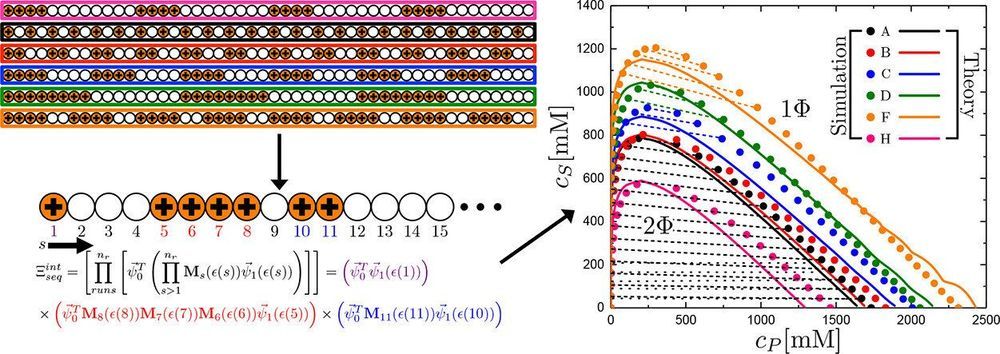Microsoft Windows 10 users, you have a serious upgrade problem which you need to know about…



Thanks to a team of researchers from the University of Illinois at Urbana-Champaign and the University of Massachusetts Amherst, scientists are able to read patterns on long chains of molecules to understand and predict behavior of disordered strands of proteins and polymers. The results could, among other things, pave the way to develop new materials from synthetic polymers.
The lab of Charles Sing, assistant professor of chemical and biomolecular engineering at Illinois, provided the theory behind the discovery, which was then verified through experiments conducted in the lab of Sarah Perry, assistant professor of chemical engineering at UMass Amherst, and Illinois alumna. The collaborators detailed their findings in a paper titled “Designing Electrostatic Interactions via Polyelectrolyte Monomer Sequence” published in ACS (American Chemical Society) Central Science.
The colleagues set out to understand the physics behind the precise sequence of charged monomers along the chain and how it affects the polymer’s ability to create self-assembling liquid materials called complex coacervates.

We are pleased to announce the launch of the Longevity Book Club hosted by LEAF Director Javier Noris, where you can join other longevity enthusiasts in reading the most interesting works that relate to our mission of ending age-related diseases.
You will also get the opportunity to listen to discussion panels and take part in Q&A sessions that are focused on books that touch on these important scientific, philosophical, moral and futuristic longevity topics. This is the ideal place to meet like-minded longevity enthusiasts who are working on building their knowledge on longevity and all of the implications that come with ending age-related diseases.

This pugnacious antipathy toward scientists, research funding and universities threatens to undercut the very advantages that have made the U.S. such a dominant technological power over the last century. Just as Hasan Ibn al-Haytham’s achievements draw a sharp contrast with the Middle East’s current lagging position in science, sepia-colored nostalgia for Isaac Newton will ring bitterly hollow if the West turns away from Newton’s legacy. A civilization is only as great as its last failure.
It’s absurd to claim otherwise — especially now, as America turns away from Newton’s legacy.
Biologist, Tyrone Hayes is a soft-spoken professor at the University of California with a big message. One of the most commonly used pesticides in agriculture, atrazine, is responsible for feminizing amphibians, according to his research. More importantly, the chemical is effectively eliminating male chromosomes at an alarming rate, at levels which are three times lower than what are currently appearing in our drinking water. It isn’t just lead and fluoride we need to be concerned about, but a known endocrine disruptor, created by Syngenta, that is utterly changing our gene pool.
Hayes has been fighting Syngenta, to report the harmful effects of Atrazine for decades now. His scientific papers describe how Atrazine demasculinizes male gonads producing testicular lesions associated with reduced germ cell numbers in teleost fish, amphibians, reptiles, and mammals, and induces partial and/or complete feminization in fish, amphibians, and reptiles. These effects are strong (statistically significant), consistent across vertebrate classes, and specific. Reductions in androgen levels and the induction of estrogen synthesis — demonstrated in fish, amphibians, reptiles, and mammals — represent plausible and coherent mechanisms that explain these effects.

Ford partnered with Agility Robotics to create Digit, a two-legged robot that could deliver your packages straight to your door in the future. Ford claims this robot can carry packages up to 40 pounds, navigate stairs, and go around unexpected obstacles.
#Ford #Robot #TechInsider
Tech Insider tells you all you need to know about tech: gadgets, how-to’s, gaming, science, digital culture, and more.
Visit us at: https://www.businessinsider.com
TI on Facebook: https://www.facebook.com/techinsider
TI on Instagram: https://www.instagram.com/tech_insider/
TI on Twitter: https://twitter.com/techinsider
TI on Amazon Prime: http://read.bi/PrimeVideo
INSIDER on Snapchat: https://insder.co/2KJLtVo

BioViva warmly welcomes Dr de Magalhaes to our Scientific Advisory Board!
Dr de Magalhaes graduated in Microbiology in 1999 from the Escola Superior de Biotecnologia in his hometown of Porto, Portugal, and then obtained his PhD in 2004 from the University of Namur in Belgium. Following a postdoc with genomics pioneer Prof George Church at Harvard Medical School, in 2008 Dr de Magalhaes was recruited to the University of Liverpool. He now leads the Integrative Genomics of Ageing Group (http://pcwww.liv.ac.uk/~aging/) which focuses on understanding the genetic, cellular, and molecular mechanisms of ageing. Dr de Magalhaes has authored over 100 publications and given over 100 invited talks, including three TEDx talks.